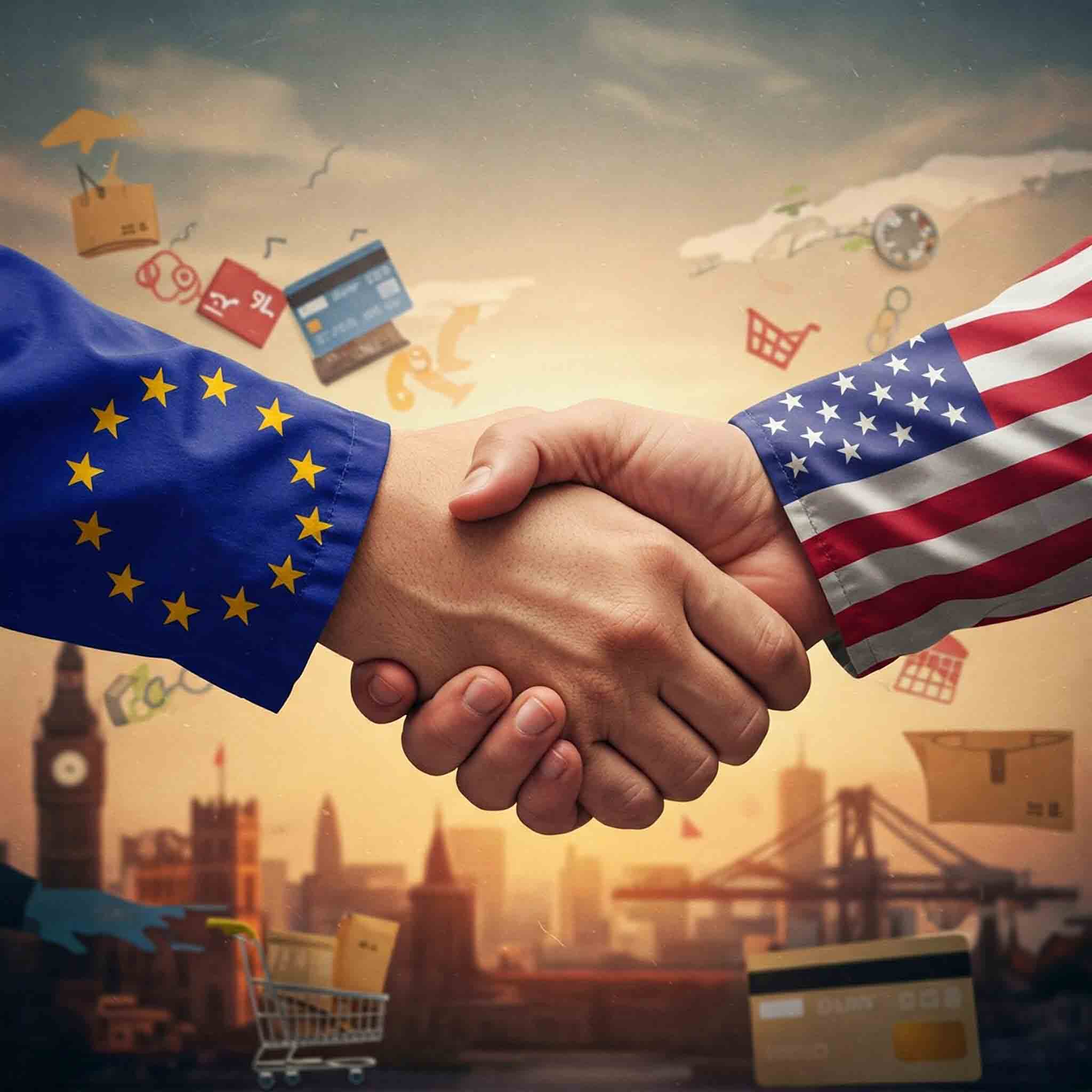In an era marked by intensifying geopolitical shifts, rising protectionism, and digital fragmentation, transatlantic cooperation between the United States and the European Union faces a critical juncture. At the heart of this moment is the consumer: a figure too often overlooked in policy debates, yet profoundly impacted by the rippling consequences of trade wars, regulatory divergence, and economic uncertainty.
Author: Szilárd Szélpál
This article draws upon the wide-ranging conversation featured in a recent episode of CEA Talk, the podcast series of CEA Magazine, where I had the privilege of speaking with two prominent policy experts: Egle Markevičiūtė, Head of Digital & Innovation Policy at the Consumer Choice Center and former Deputy Minister of Economy and Innovation of Lithuania, and Yaël Ossowski, Deputy Director of the Consumer Choice Center. The dialogue was anchored around the CCC’s timely policy paper, “A Consumer-Focused Alternative: Reshoring Atlanticism in the Age of Uncertainty”, and unpacked the stakes, risks, and paths forward for transatlantic economic relations.

Tariff Wars and Economic Nationalism
The resurgence of trade protectionism under the renewed Trump administration, including the imposition of a 25% tariff on imported vehicles and parts, has reignited long-standing tensions between the US and its European allies. For Ossowski, this marks not just a policy maneuver, but a systemic shift with historical echoes: “We’re back to the 1930s-style tariff logic,” he said, referring to policies that exacerbated the Great Depression. Markevičiūtė echoed this concern, warning that retaliatory tariffs, even when delayed or softened by diplomacy, ultimately rebound on consumers.
The EU’s measured response—delaying its planned retaliatory tariffs—was framed as a rational, consumer-protective strategy. However, both speakers acknowledged that unless a broader structural dialogue is reinitiated, such as through a revitalized Trade and Technology Council (TTC), we risk entrenching a cycle of reactionary policymaking.
The Cost to Consumers and Innovation
Trade is not simply an exchange between governments; it is the daily activity of individuals, companies, and consumers seeking better options, affordability, and innovation. Both experts stressed that consumers bear the brunt of these tensions: not only in higher prices, but in delayed access to technologies, fragmented services, and a decline in competitive pressure that fosters innovation.
Yaël warned that these tariffs create “regime uncertainty,” where firms and households struggle to make long-term decisions. Egle added that while Europe’s digital rulebook aims to protect rights and competition, it has also created a friction point with the US, particularly for American tech firms struggling to adapt to the EU’s regulatory demands.
Strategic Dependence and Global Rivalries
The discussion expanded into how these economic tensions reflect a broader struggle over global influence, particularly in Africa. China and Russia, through coordinated strategies, are consolidating control over critical mineral resources such as lithium and cobalt—vital for the green and digital transitions.
Egle noted Europe’s soft power is insufficient compared to China’s economic leverage and Russia’s hard power tactics. Both panelists argued that the US and EU need to align more strategically in foreign development policies and infrastructure investments. This includes not just competing in Africa, but also maximizing untapped domestic and allied resources, such as Canadian mineral reserves and American LNG terminals.
Digital Divergence: A Fragmented Internet?
One of the most pressing concerns is the growing divergence in digital regulation. The EU’s GDPR, DSA, and DMA are reshaping the digital landscape, while the US is still navigating fragmented state-level rules and sectoral policies. This asymmetry poses challenges for innovation, market access, and consumer clarity.
Ossowski emphasized the need for mutual recognition and harmonization, warning that “consumers live on a global internet, but our rules are becoming increasingly territorial.” Markevičiūtė added that while regulatory sovereignty is essential, the lack of mutual impact assessments risks leaving consumers worse off, especially when innovation is stifled.
Energy Security and Technological Synergies
Amid these divides, energy cooperation emerges as a bright spot. Both speakers highlighted opportunities for the EU and US to collaborate on LNG infrastructure, nuclear innovation, and renewable grid technologies. The case of Lithuania’s early investment in an LNG terminal, “Independence,” was held up as a model for how strategic foresight can reduce dependence on adversarial energy sources.
Still, Yaël reminded us that such cooperation must be market-based and innovation-driven, not merely government-mandated. Privatized small nuclear reactors, transatlantic technology transfers, and interoperability of clean tech systems were cited as areas ripe for policy support.
Intellectual Property and Rule of Law
A significant, if underdiscussed, pillar of transatlantic trust is intellectual property protection. As Egle warned, without EU-US coordination on IP standards, institutions like the WTO risk becoming obsolete. Yaël emphasized that strong IP rights are not just a business interest, but a consumer one: they ensure product quality, safety, and legal redress.
Defense and Cybersecurity: Shared Security, Shared Responsibility
Finally, the dialogue turned to defense and cybersecurity. With increasing pressure on Europe to raise its defense spending and uncertainties around US commitments, the role of NATO and mutual innovation ecosystems becomes crucial. From cybersecurity infrastructure to next-gen defense technologies, the panelists underscored the need to view these not as zero-sum national priorities, but as shared transatlantic ventures.
Conclusion: Reimagining the Consumer-Centric Transatlantic Relationship
As we concluded the conversation, one theme stood above all: the imperative of pragmatic optimism. Transatlantic cooperation must be reframed not as a geopolitical obligation, but as a consumer-first opportunity. The crises of our time—from trade wars and tech fragmentation to energy insecurity and resource nationalism—are complex, but not insurmountable.
What we need is a reinvigorated commitment to shared values, mutual learning, and regulatory coherence. The future of the transatlantic alliance depends not only on political will but on our ability to center the consumer in our policy frameworks.
The stakes are high. But as Egle and Yaël both emphasized, this is also a moment of possibility. A renewed Atlanticism—rooted in innovation, openness, and civic trust—can serve as a powerful counterweight to the growing influence of authoritarian models of governance and economic coercion.
Now is the time to act. Not just to protect markets or borders, but to empower people. And in doing so, to build a transatlantic relationship truly fit for the 21st century.
Egle Markevičiūtė is a public affairs specialist and the Head of Digital & Innovation Policy at the Consumer Choice Center.
Yaël Ossowski is a consumer and technology advocate, journalist, and writer. He is deputy director at the Consumer Choice Center.
Cover photo credit: ChatGPT

Szilárd Szélpál served as an environmental expert in the European Parliament from 2014, where he utilized his expertise to influence policy-making and promote sustainable practices across Europe. In addition to his environmental work, Szilárd has a deep understanding of foreign affairs, offering strategic advice and contributing to the development of policy initiatives in this field.



